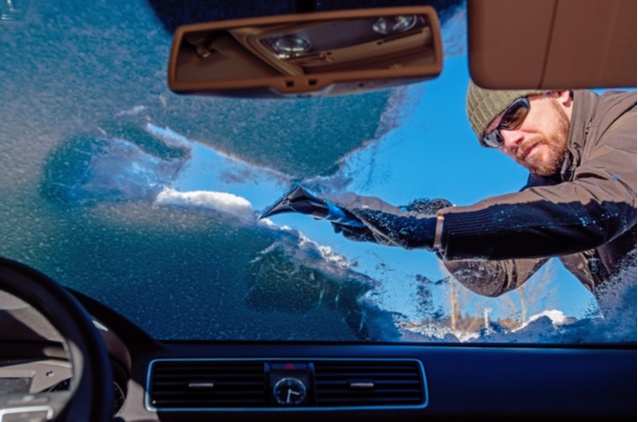This Emergency Checklist Will Help Prepare You for Winter Weather
Posted by Kristopher Schwind

The Northeast has already seen a staggering amount of snow this season, with peak snowfall topping 40 inches in Pennsylvania, New York, Vermont, and New Hampshire in a single storm alone. Inclement weather brings greater potential for power outages—and now is the time to prepare for the worst.
Be prepared to survive a winter power outage. Make sure your home, your business, and your family are ready for the worst this winter with this emergency checklist.
Things to Discuss
First, be sure to have a conversation with all of your household members, coworkers, or building tenants to be sure that they understand what constitutes a disaster, how to react to different emergencies, and where to locate what they need.
- The dangers of inclement winter weather
- Who will be responsible for which roles in the event of an emergency
- Where to locate designated on-site “safe spots” (e.g. the rooms/areas you plan on powering with your standby generator)
- What to do in the event of personal injuries
- What to do in the event of a power outage
- How to turn off water, gas, and electricity
- Where to locate emergency phone numbers
- Where to locate printed floor plans
- How—and when—to call 911, the police, and the fire department
- Where to locate emergency meeting places—one near the building, one outside of the neighborhood
- Where to find local CPR and first-aid classes
- Where evacuation routes are located in your area
- How to check your generator during a storm
Items to Secure
Be sure to have at least a basic set of emergency supplies in the event of a disaster. It’s important to keep a certain amount of back-up necessities in case you’re unable to leave the property.
- A generous supply of clean drinking water (at least 1 gallon per person per day as recommended by the Red Cross)
- Supply of non-perishable food items
- Supply of non-perishable pet food (if applicable)
- A non-electric can opener
- At least one change of clothing
- Winter gear (e.g. coats, gloves, hats, water-resistant boots, etc.)
- Rain gear (e.g. rain coats, ponchos, umbrellas, etc.)
- Sturdy shoes and/or boots
- Blankets or sleeping bags
- A well-stocked first aid kit (here’s what you should include)
- Extra pairs of prescription glasses (if applicable)
- A battery-powered radio
- At least one flashlight
- A set of glow sticks
- A box of waterproof matches
- Extra firewood/coal (if applicable)
- Plenty of extra batteries
- Back-up containers of gasoline
- A well-stocked toolbox (here’s how to assemble a basic tool kit)
- A fully charged back-up cell phone charger (if available)
- A 3–6 day supply of medications (per individual)
- Credit cards/Cash/Checkbooks/Traveler’s Checks
- Extra sets of car keys
- Copies of deeds/titles, insurance policies, birth certificates, other critical documents
- Printed maps of the region
- Printed list of family physicians
- Printed list of emergency contacts
- Printed list of important family/employee/tenant information
- Printed list of styles and serial numbers of medical devices (i.e. pacemakers)
- Printed emergency phone numbers
- Printed floor plans
- A fire-proof, water-proof container for important documents
Structural & Mechanical Preparations
The best way to prepare for winter emergencies is to ensure that the structural integrity of your residential or commercial building is sound. There are a few ways to prepare your home or business to withstand inclement winter weather.
- Keep a sturdy shovel near the front and back of your home or building
- Keep a supply of salt/deicer products within reach
- Check that the building is properly insulated
- Get a supply of heavy duty plastic sheeting (in case of emergency repairs)
- Have your chimney cleaned regularly to avoid build-up (if you have one)
- Learn how to prevent frozen pipes
- Keep the gas tank on your personal vehicles/company vehicles at least half full
- Be sure your personal vehicles/company vehicles are stocked with the following:
- Window-breaker/seatbelt cutter
- Signal flare kit
- Jumper cables
- Wrenches
- Tire patch kit
- Spare tire
- Install/maintain a reliable source of emergency back-up power
You can rely on National Standby Repair to take care of that last one. If you already have a residential or commercial standby generator, consider starting an Annual Service Contract to ensure your system continues to provide decades of service and save thousands of dollars in repair and replacement costs. (Plus, our NSR Annual Service Contract warranties your generator, even after the manufacturer’s warranty has expired.)
Don’t have a standby generator? We’re happy to offer a free generator assessment to determine what model works best for your home, business, or building.
Kristopher Schwind is the proud owner of National Standby Repair.
 24/7 EMERGENCY GENERATOR SERVICE
24/7 EMERGENCY GENERATOR SERVICE REQUEST A QUOTE
REQUEST A QUOTE
 (914) 734-1400
(914) 734-1400